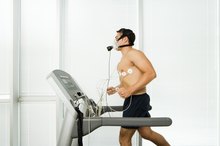Does Exercise Cause an Adrenaline Rush?
Adrenaline is another word for the hormone epinephrine, part of the brain's response to exercise. Epinephrine has an effect on your body to increase the cardiorespiratory activity that facilitates exercise. It also has an affect on your metabolism and can even improve your mood.
Mechanism
Even the anticipation of exercise can spark a rush of adrenaline. Upon exercise or before, your brain sends a signal to your adrenal glands. In response, your adrenal glands excrete epinephrine into the bloodstream. The release of epinephrine is greater in an untrained person than a trained person.
- Even the anticipation of exercise can spark a rush of adrenaline.
- Upon exercise or before, your brain sends a signal to your adrenal glands.
Effect
What Happens to the Blood Oxygen Level When a Human Exercises?
Learn More
Epinephrine is released as part of the sympathetic nervous system initiating the "fight or flight response.'' It increase your heart rate in order to increase the amount of blood your heart beats each minute. More blood flowing means a larger amount of oxygen available to your muscles that need it. It also works to constrict your blood vessels, increasing your blood pressure and to allow more blood to your muscles.
- Epinephrine is released as part of the sympathetic nervous system initiating the "fight or flight response.''
- It increase your heart rate in order to increase the amount of blood your heart beats each minute.
Mood
Regular exercise training can increase your mood. With regular exercise comes a reduction in the levels of epinephrine at rest. Less sympathetic nervous system innervation leads to a reduction in the intense feelings that come from epinephrine. In addition, depletion of epinephrine on a daily basis that can come from being over-stimulated can lead to fatigue. Less fatigue can mean a happier mood.
- Regular exercise training can increase your mood.
- Less sympathetic nervous system innervation leads to a reduction in the intense feelings that come from epinephrine.
Metabolism
Why Does Your Heart Beat Fast When You Exercise?
Learn More
Your adrenaline rush from epinephrine also influences your metabolism. Epinephrine stimulates the metabolism of carbohydrate and fat stores inside your body. In preparation for the "fight or flight response" your body must have ample fuel to run on. For this reason, epinephrine increases the activity of the hormones responsible for breaking down glycogen and fat and making it available for your muscles.
- Your adrenaline rush from epinephrine also influences your metabolism.
- For this reason, epinephrine increases the activity of the hormones responsible for breaking down glycogen and fat and making it available for your muscles.
Related Articles
References
- "Exercise Physiology: Human Bioenergetics and Its Applications"; George A. Brooks, et al.; 2005
- Penn Medicine: Epinephrine and Exercise
- "Anatomy and Physiology"; Kenneth Saladin;
- MayoClinic.com; Exercise and Stress: Get Moving to Combat Stress; 2010
- "The Endocrine System in Sports and Exercise"; William J. Kraemer, et al.; 2005
- Alvarez-Perea A, Tanno LK, Baeza ML. How to manage anaphylaxis in primary care. Clin Transl Allergy. 2017;7:45. doi:10.1186/s13601-017-0182-7
- Merck Manual Professional Version. Addison Disease. Updated July 2019.
- U.S. National Library of Medicine. Epinephrine Injection. Updated November 15, 2018.
- Kim H, Lee JM, Seo KS, Kwon SM, Row HS. Anaphylactic reaction after local lidocaine infiltration for retraction of retained teeth. J Dent Anesth Pain Med. 2019;19(3):175–180. doi:10.17245/jdapm.2019.19.3.175
Writer Bio
Laura Niedziocha began her writing career in 2007. She has contributed material to the Stoneking Physical Therapy and Wellness Center in Lambertville, N.J., and her work has appeared in various online publications. Niedziocha graduated from Temple University with a Bachelor of Science in exercise science. She also has her Associate of Arts in communications from the Community College of Philadelphia.









